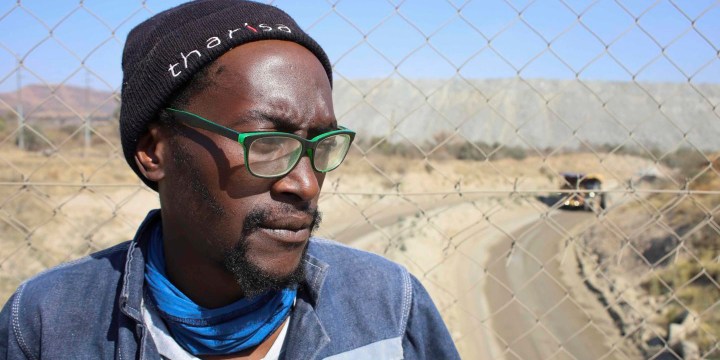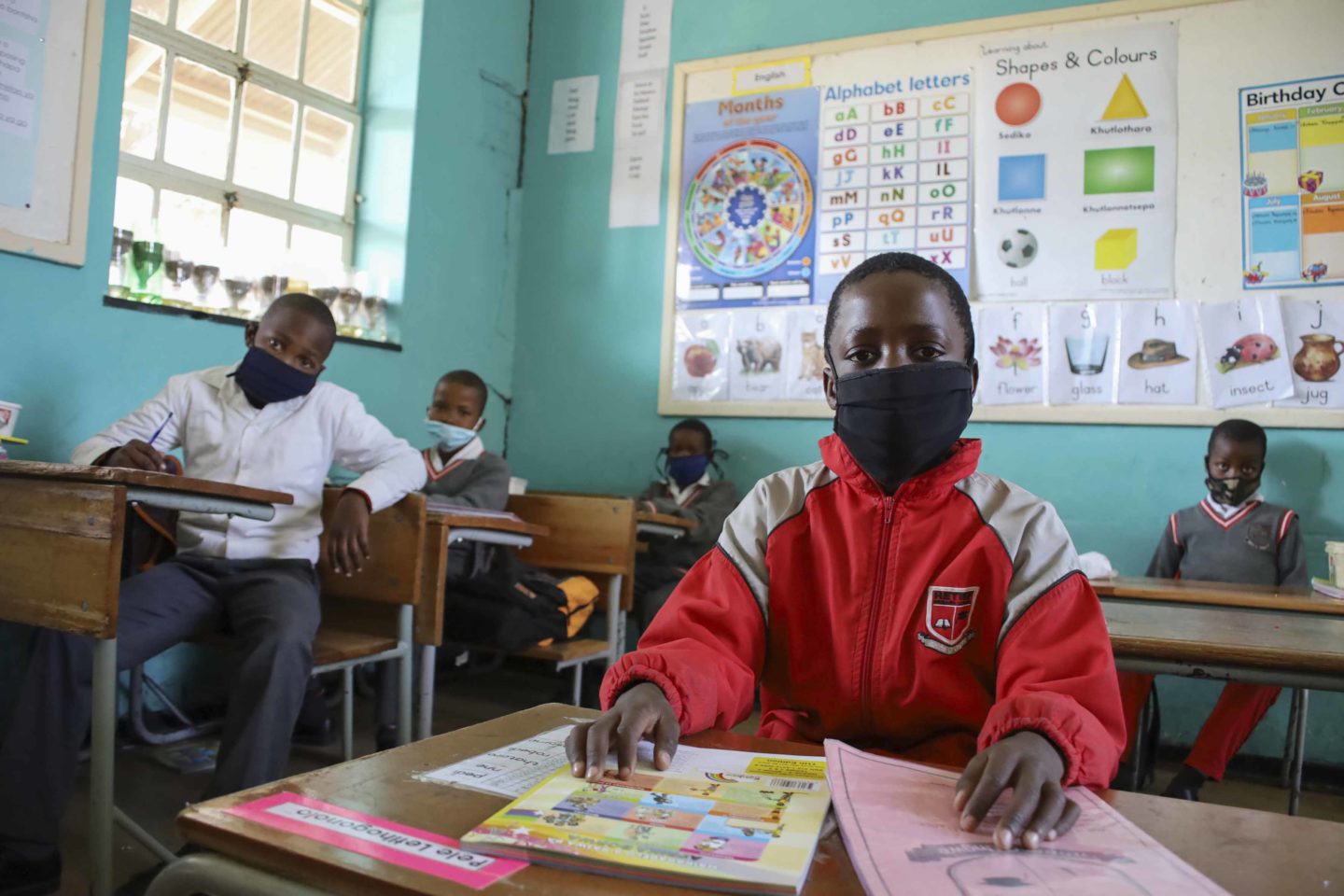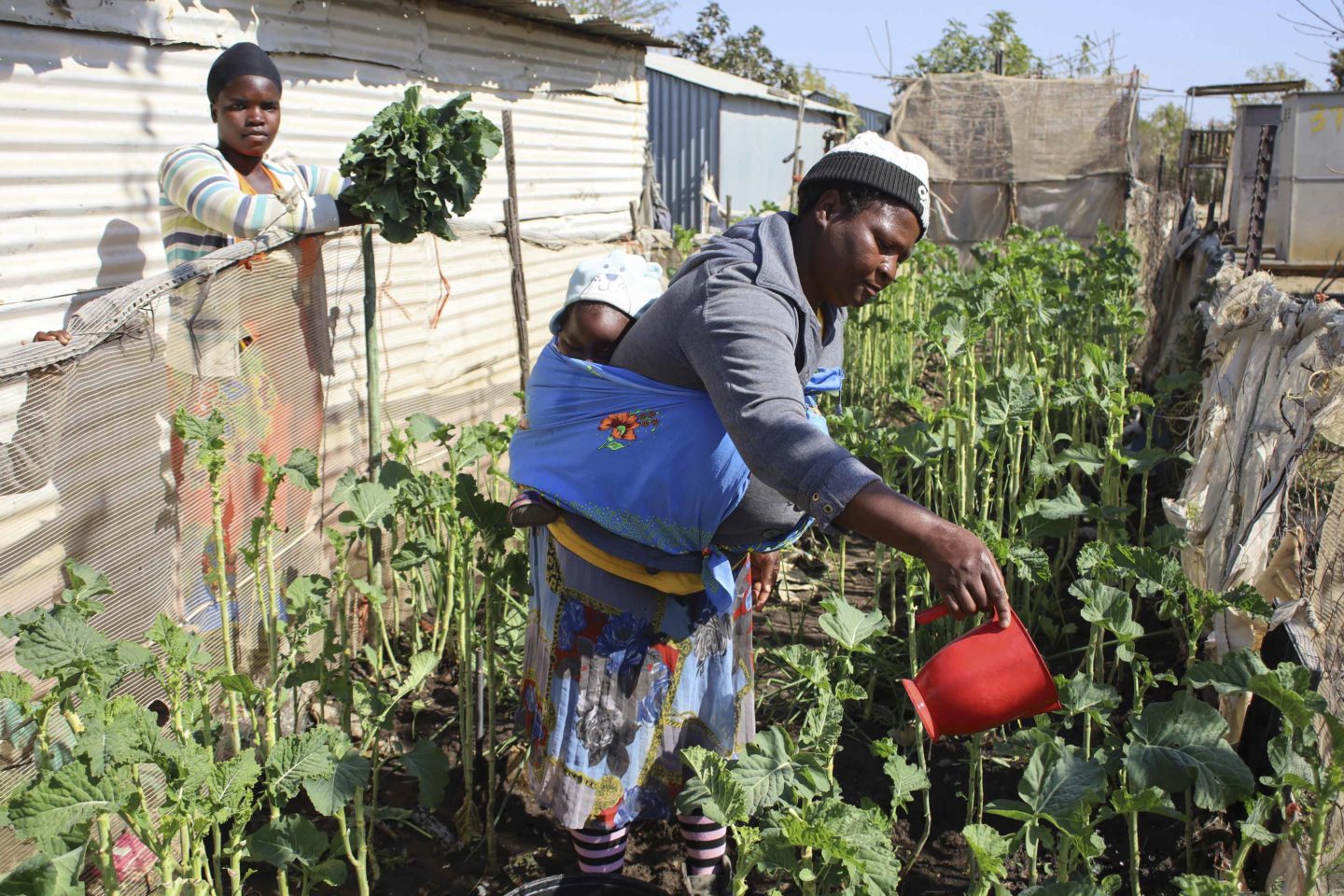NEW FRAME
Marikana – The struggle for breath and dignity

The Marikana area in North West province may be rich in platinum group metals, but the profits from mining them do not benefit residents, who have little hope of improving their lives.
This article was first published by New Frame.
“We are dying slowly in Marikana,” says Bongani Mpofu, 31, who lives in the North West province mining town’s Maditlokwa shack settlement. “The carbon monoxide that comes from underground by way of ventilators that are positioned in the veld blows in the direction of the community.
“That poison affects the environment and eventually kills us. Some residents are already suffering from chronic diseases such as lung infections, TB [tuberculosis] and silicosis. The mines should open their health facilities so that those who are affected could be screened and examined by the doctors.”
Nine years after the most violent and bloodiest massacre in post-apartheid South Africa, Marikana still finds itself largely undeveloped and at the mercy of the mining companies that populate the platinum belt. Previously known as Rooikoppies (red hills), the town was established in 1870. Situated 24km east of Rustenburg, it started as a railway station with a few shops next to it and, decades later, expanded to include farms where mielies and tobacco were among the many crops grown.
But today Marikana is known for the massacre that took place on 16 August 2012 when the police mowed down striking mineworkers. Thirty-four miners were killed that day, only two of whom were not employed by Lonmin. The total death toll for the duration of the lengthy strike was 44, and the families who lost loved ones are yet to see justice.

A shack settlement in Marikana, near the Tharisa Minerals mine, on 31 July 2021. (Photo: Bonile Bam)
Life in Marikana, which the striking miners wanted to improve by demanding pay of R12 500 a month, hasn’t changed much for those who remain in the town. Most of the families who live here are impoverished.
In Maditlokwa, homes are mostly temporary structures built from corrugated iron attached to wooden frames. The wood for these frames is collected from the bush because the residents cannot afford to buy materials from the hardware store. Most of the houses have no electricity or running water.
The two-room brick houses built by Tharisa Minerals are not any better, say residents. Josephina Khumalo, 54, originally from Zeerust, lives in one of these houses as she was among the people who were moved from what was then a farm to make way for the mine.
Fending for themselves
“Most of us have been living in these so-called temporary houses built by Tharisa for a long time,” says Khumalo. “Because we see that the two-room structures can’t fit the whole family, we extend it by building the shacks next to it in order to accommodate our children. It doesn’t make sense to share a bedroom with children. They deserve their own space too.
“My house, which was built by Tharisa Mine in 2012, does not have electricity and water connection. Most residents have opted to find other means to get their homes lit at night. Some people still have shacks built by the same company which promised them proper houses more than a decade ago,” says Khumalo.
“When they blast, I have a headache and feel dizzy. Dust is our main problem. Sometimes it is difficult to breathe. The glasses, TV and dishes in the house break [when they are blasting].
“Now that it is winter, we feel cold. The majority of people are desperate to leave this place. There are rumours that the mine will shift us to another place. If we get land and dignified houses, we would live in peace. For now, there is no safety. Instead, we live in fear of the earth shaking any time.”
llja Graulich, Tharisa’s head of investor relations and communications, says the houses the company has built have been constructed in accordance with its social and labour plan. “The majority of persons were living in illegal settlements on Tharisa property and Tharisa footed the bill for newer and better structures [than the ones] that they were living in at the time. Also, sanitation and water is provided on a much improved scale.”
He says that dust originating from mining and processing operations at Tharisa mines is rigorously and continuously monitored. “Fugitive dust is monitored at various locations within the operation as well as specific sites in neighbouring areas to ensure compliance with applicable legislation.
“A dust-suppression spray system, through the use of water bowsers, reduces fugitive dust levels from the respective crushers, conveyors and transfer points. In addition, Tharisa Minerals applies a dust suppressant on its access roads to further reduce the mine’s dependence on water for dust suppression,” said Graulich.
Dust and degradation
The principal of Retief Primary School in Marikana, Martin Setone, says the blasting is affecting everyone at the school. “[When] Tharisa do their blasting, they do so even during the course of the day when we are here at the school. There is often a clear indication of dust that is coming from their direction to our school.
“Apart from dust, the biggest challenge is the buildings. The walls are cracking. I had to close some offices because I’m afraid that something might happen any time simply because these cracks are increasing day by day. Unfortunately, we share [a] fence with the mine,” says Setone.
Graulich says the mine has set blasting times that are communicated to the surrounding community. “Blasting does not take place when we feel like it, but has a set pattern and all stakeholders are fully briefed. We have teams inspecting sites around the mine post blasting, and any structural issues that may have been caused by blasting are fixed by the mine. Any damage that can be attributed to the blasting is repaired by the company,” he says.
He adds that the company has taken good care of the people who had to be moved because of the mine. “As part of any relocation, we have in the past [been] and remain in constant contact with various statutory bodies, [including] ongoing engagement with the ward councillor, Rustenburg municipality and the human settlement directorate in the municipality, and you will have noticed in your research that any houses that we have constructed as part of any relocation undertaken have basic services as part of this relocation provided to them.”

Josephina Khumalo, who lives in Maditlokwa in Marikana, is afraid that her cracked house could collapse any time. (Photo: Bonile Bam)
But Khumalo’s house contradicts Graulich’s statement. And with more than 500 large trucks carrying chromite passing through the town every day, the badly damaged roads are evidence of how the community is ignored.
Yet Graulich insists the mine has undertaken many initiatives to improve life for the residents. “We have built roads within the community, which was not the case before,” he says. “We have built a community centre. We have provided skills training for the youth. We have provided bursaries for deserving students to study at higher institutes of learning.
“We have identified youth with matric, but who did not have mathematics and science, and have enrolled them at institutions to improve their mathematics and science and then into further institutions of higher learning to afford them opportunities to obtain qualifications, which will assist them to get employment.
“All job opportunities are given to community members prior to [the] same [job] being given to outside people. We have put a number of community members into our enterprise development programmes and a number of them are now providing services to the mine.”

Pupils from Retief Primary School in Marikana on 30 July 2021 learn in a classroom with cracked walls caused by blasting at the nearby Tharisa Minerals mine. (Photo: Bonile Bam)
A future without hope
Raserola Mashamaite, 31, a community activist and founder of the Marikana Youth Development Organisation, paints a different picture. The resident of Storm Huis, a shack settlement in Marikana, was among the youngsters who supported the strike in 2012 in the hope that it would highlight youth unemployment in the area.
“There is no service delivery here,” Mashamaite says. “You can’t find a community centre where the youth can entertain themselves. Instead, young men spend their money and time at taverns, shebeens, bottle stores, taking drugs or committing crime. When they quit school, they become vulnerable. Most of them anticipate that they would find employment at the mines. That is their main dream. On the other hand, young ladies end up being pregnant, giving themselves to mineworkers in order to have money, while others die of STDs [sexually transmitted diseases].”
In 2017, Mashamaite and a group of young people initiated a programme to assist the youth of Marikana, but it has been unsuccessful because of financial difficulties. He says no one helps them and they are targeted by the police and private security companies.
“They want to silence the activists because we are vocal and express the wrong things that are happening on the ground. It is important to note that the mines are the biggest contributors to poverty in Marikana. The youth are not being considered, the mines don’t care about our community,” he adds.
Khalipha Msindo, 32, from Ntabankulu in the Eastern Cape, lives in Marikana West with her three children. She left school in grade 9. “We have many challenges in our community which need urgent attention,” she says. “Our councillors do not bother to come and see where we live. Under this government we still have serious issues such as [a lack of] housing, water, electricity and roads.
“This place is dirty and unhealthy. You see children’s nappies on the streets or outside the yard. If we had dustbins and the municipality truck came to collect the rubbish, it would have been better. It is not safe to go to the toilets at night. The latest time that feels safe is around 7pm when everyone is still moving.
“At night, the streets are always dark. You cannot see a person following you from the toilet. Women and girls live in fear of being raped when they go out at night. There is absolutely no service delivery, no jobs in this place. Even our toilets are in the veld. To restore the community’s dignity, Tharisa should find us a better place to live and build us proper houses,” says Msindo.

Nosipho Dlezi (left) and Khalipa Msindo clean the community toilets in Storm Huis shack settlement in Marikana’s township on 31 July 2021. They say these ablution facilities are unsafe, dirty and lack privacy. (Photo: Bonile Bam)
Empty promises
The residents say Tharisa Minerals offered to build them houses when it acquired their land and they had to relocate. Instead, the company constructed temporary structures with promises to build proper houses in the future. They are also upset that nothing has come of a community trust that was established to benefit them, and approaching the high court in Gauteng has not brought clarity.
“We have been asking for the financial report but it was never there,” alleges a trust member who does not want to be named. “All we wanted was to know what happened to the dividends. When we arrived [at the court], we noticed that it was changed to Tharisa Security by a community member who now works in that mine.”
In response, Graulich says the community around Tharisa’s mine, as defined by the company’s social and labour plan, is a 6% shareholder making up 6% in the 26% black economic empowerment stake, with the remainder owned by a broad group of women investors.
“The Tharisa Trust that owns the 6% also receives dividends, while the stake received by the trust was donated, i.e. they never had to pay for this 6%. So there is a benefit for the community, in our case, that the trust owns 6% of the mine and [it] is independently administered. These allegations need to be put to the trustees.”
A resident who wants to remain anonymous claims that Tharisa Minerals spies on activists. “Private individuals from the neighbourhood are enticed to detect those who are fighting for their rights against the mine. In return, they are either offered employment in the [mine] and in the security sector or paid to do part-time jobs there.”
Graulich dismisses the allegations, saying: “We do not engage in spying.”

Celina Muguruzo, a migrant from Mozambique who has lived in Marikana for five years, waters her backyard garden while her friend, Meri Pelipe, looks on. (Photo: Bonile Bam)
Celina Muguruzo, 45, a migrant from Espungabera in Mozambique, has been living in Marikana for five years. “Unfortunately, I have never found a job since arriving in South Africa,” she says. “I tried to search for it when I lost one where I looked after the neighbour’s babies. Since then, I have struggled to find a stable job.
“One of the painful situations I found myself in are my two boys who aren’t attending school because they have no birth certificates. When the coronavirus arrived, I did not have food to feed my three children. The garden helped me a lot. Last year, I relied on borrowing groceries and little items from the spaza shop and I would pay them back when my husband got his salary at the end of the month. I try to store water in bottles and buckets for cooking and washing,” says Muguruzo.
“In 2018, I started a vegetable garden at the back of my shack where I planted leafy green vegetables such as kovu [kale], tsunga [mustard greens], tomatoes, onion and spinach. To keep it green and alive, I often pray to it every morning. Customers do come to buy. It all depends on how much a person can afford. I sell a bunch for R10, but I accept even as little as R2 or R5 if a person does not have enough money.”
With a renewed focus on Marikana because of the nine-year anniversary of the massacre, residents of the town hope that the attention leads to an improvement in their lives without them having to put their lives at risk to demand it. DM
This story has been updated to reflect a full response from Tharisa Minerals.




















 Become an Insider
Become an Insider
Shows how Coms of E are a waste of money.